Weizhe Yuan
The Llama 4 Herd: Architecture, Training, Evaluation, and Deployment Notes
Jan 15, 2026Abstract:This document consolidates publicly reported technical details about Metas Llama 4 model family. It summarizes (i) released variants (Scout and Maverick) and the broader herd context including the previewed Behemoth teacher model, (ii) architectural characteristics beyond a high-level MoE description covering routed/shared-expert structure, early-fusion multimodality, and long-context design elements reported for Scout (iRoPE and length generalization strategies), (iii) training disclosures spanning pre-training, mid-training for long-context extension, and post-training methodology (lightweight SFT, online RL, and lightweight DPO) as described in release materials, (iv) developer-reported benchmark results for both base and instruction-tuned checkpoints, and (v) practical deployment constraints observed across major serving environments, including provider-specific context limits and quantization packaging. The manuscript also summarizes licensing obligations relevant to redistribution and derivative naming, and reviews publicly described safeguards and evaluation practices. The goal is to provide a compact technical reference for researchers and practitioners who need precise, source-backed facts about Llama 4.
RESTRAIN: From Spurious Votes to Signals -- Self-Driven RL with Self-Penalization
Oct 02, 2025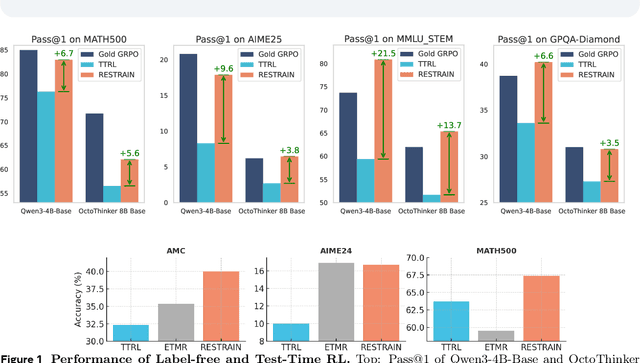
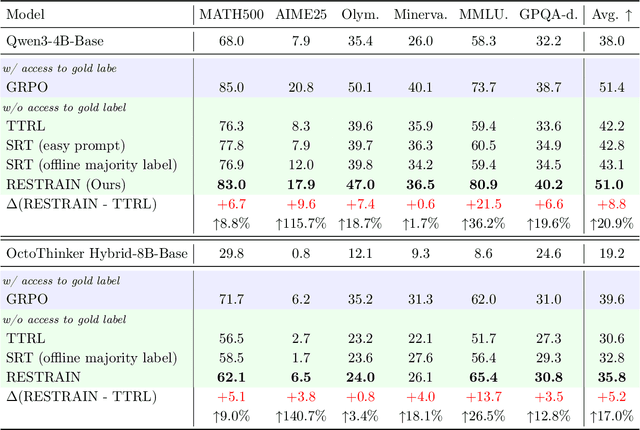

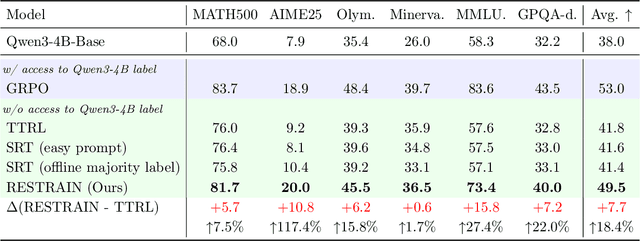
Abstract:Reinforcement learning with human-annotated data has boosted chain-of-thought reasoning in large reasoning models, but these gains come at high costs in labeled data while faltering on harder tasks. A natural next step is experience-driven learning, where models improve without curated labels by adapting to unlabeled data. We introduce RESTRAIN (REinforcement learning with Self-restraint), a self-penalizing RL framework that converts the absence of gold labels into a useful learning signal. Instead of overcommitting to spurious majority votes, RESTRAIN exploits signals from the model's entire answer distribution: penalizing overconfident rollouts and low-consistency examples while preserving promising reasoning chains. The self-penalization mechanism integrates seamlessly into policy optimization methods such as GRPO, enabling continual self-improvement without supervision. On challenging reasoning benchmarks, RESTRAIN delivers large gains using only unlabeled data. With Qwen3-4B-Base and OctoThinker Hybrid-8B-Base, it improves Pass@1 by up to +140.7 percent on AIME25, +36.2 percent on MMLU_STEM, and +19.6 percent on GPQA-Diamond, nearly matching gold-label training while using no gold labels. These results demonstrate that RESTRAIN establishes a scalable path toward stronger reasoning without gold labels.
StepWiser: Stepwise Generative Judges for Wiser Reasoning
Aug 27, 2025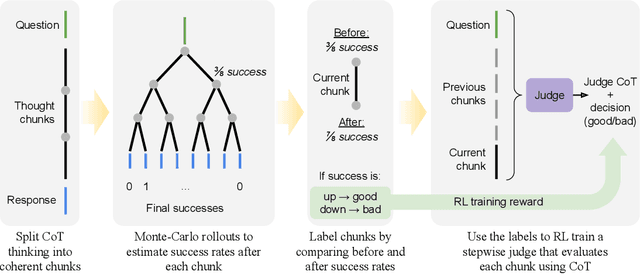



Abstract:As models increasingly leverage multi-step reasoning strategies to solve complex problems, supervising the logical validity of these intermediate steps has become a critical research challenge. Process reward models address this by providing step-by-step feedback, but current approaches have two major drawbacks: they typically function as classifiers without providing explanations, and their reliance on supervised fine-tuning with static datasets limits generalization. Inspired by recent advances, we reframe stepwise reward modeling from a classification task to a reasoning task itself. We thus propose a generative judge that reasons about the policy model's reasoning steps (i.e., meta-reasons), outputting thinking tokens before delivering a final verdict. Our model, StepWiser, is trained by reinforcement learning using relative outcomes of rollouts. We show it provides (i) better judgment accuracy on intermediate steps than existing methods; (ii) can be used to improve the policy model at training time; and (iii) improves inference-time search.
CoT-Self-Instruct: Building high-quality synthetic prompts for reasoning and non-reasoning tasks
Jul 31, 2025Abstract:We propose CoT-Self-Instruct, a synthetic data generation method that instructs LLMs to first reason and plan via Chain-of-Thought (CoT) based on the given seed tasks, and then to generate a new synthetic prompt of similar quality and complexity for use in LLM training, followed by filtering for high-quality data with automatic metrics. In verifiable reasoning, our synthetic data significantly outperforms existing training datasets, such as s1k and OpenMathReasoning, across MATH500, AMC23, AIME24 and GPQA-Diamond. For non-verifiable instruction-following tasks, our method surpasses the performance of human or standard self-instruct prompts on both AlpacaEval 2.0 and Arena-Hard.
NaturalThoughts: Selecting and Distilling Reasoning Traces for General Reasoning Tasks
Jul 02, 2025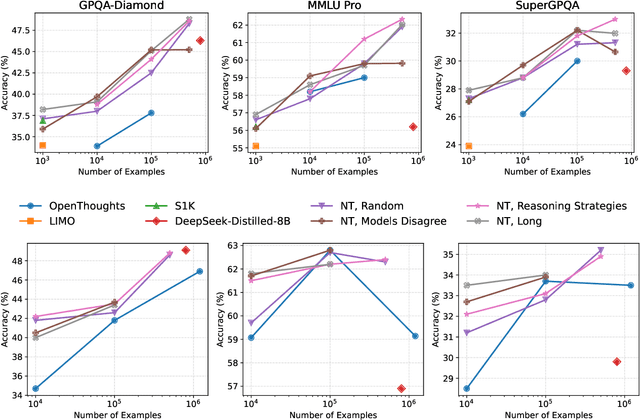
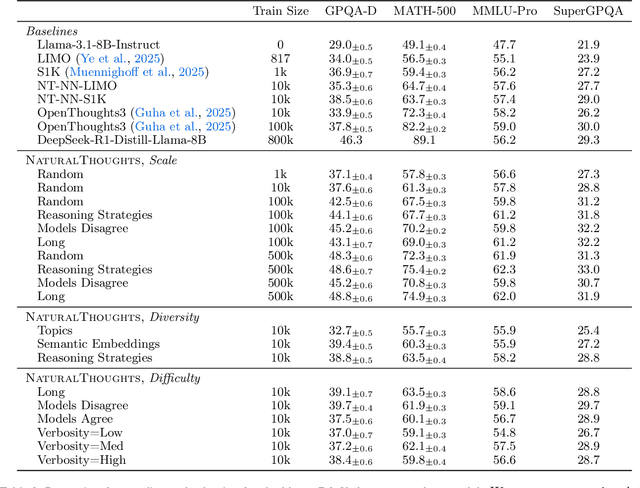
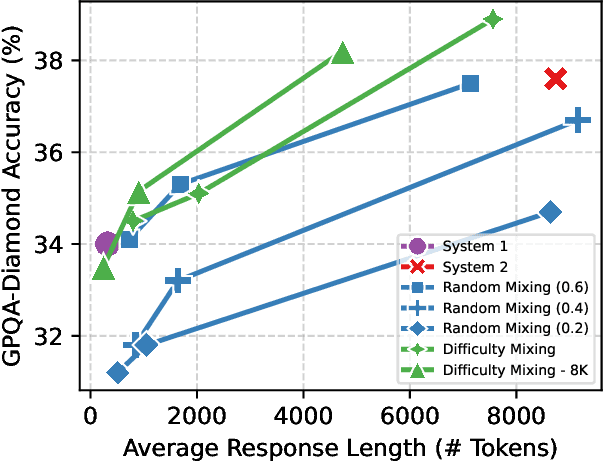
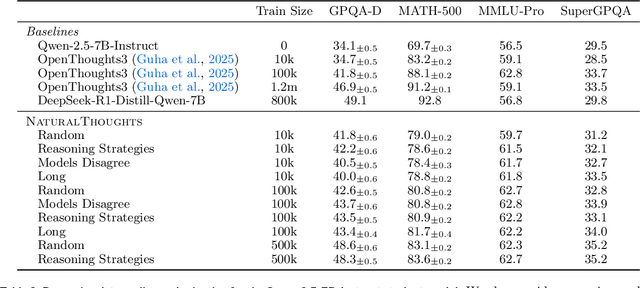
Abstract:Recent work has shown that distilling reasoning traces from a larger teacher model via supervised finetuning outperforms reinforcement learning with the smaller student model alone (Guo et al. 2025). However, there has not been a systematic study of what kind of reasoning demonstrations from the teacher are most effective in improving the student model's reasoning capabilities. In this work we curate high-quality "NaturalThoughts" by selecting reasoning traces from a strong teacher model based on a large pool of questions from NaturalReasoning (Yuan et al. 2025). We first conduct a systematic analysis of factors that affect distilling reasoning capabilities, in terms of sample efficiency and scalability for general reasoning tasks. We observe that simply scaling up data size with random sampling is a strong baseline with steady performance gains. Further, we find that selecting difficult examples that require more diverse reasoning strategies is more sample-efficient to transfer the teacher model's reasoning skills. Evaluated on both Llama and Qwen models, training with NaturalThoughts outperforms existing reasoning datasets such as OpenThoughts, LIMO, etc. on general STEM reasoning benchmarks including GPQA-Diamond, MMLU-Pro and SuperGPQA.
Bridging Offline and Online Reinforcement Learning for LLMs
Jun 26, 2025Abstract:We investigate the effectiveness of reinforcement learning methods for finetuning large language models when transitioning from offline to semi-online to fully online regimes for both verifiable and non-verifiable tasks. Our experiments cover training on verifiable math as well as non-verifiable instruction following with a set of benchmark evaluations for both. Across these settings, we extensively compare online and semi-online Direct Preference Optimization and Group Reward Policy Optimization objectives, and surprisingly find similar performance and convergence between these variants, which all strongly outperform offline methods. We provide a detailed analysis of the training dynamics and hyperparameter selection strategies to achieve optimal results. Finally, we show that multi-tasking with verifiable and non-verifiable rewards jointly yields improved performance across both task types.
An Overview of Large Language Models for Statisticians
Feb 25, 2025



Abstract:Large Language Models (LLMs) have emerged as transformative tools in artificial intelligence (AI), exhibiting remarkable capabilities across diverse tasks such as text generation, reasoning, and decision-making. While their success has primarily been driven by advances in computational power and deep learning architectures, emerging problems -- in areas such as uncertainty quantification, decision-making, causal inference, and distribution shift -- require a deeper engagement with the field of statistics. This paper explores potential areas where statisticians can make important contributions to the development of LLMs, particularly those that aim to engender trustworthiness and transparency for human users. Thus, we focus on issues such as uncertainty quantification, interpretability, fairness, privacy, watermarking and model adaptation. We also consider possible roles for LLMs in statistical analysis. By bridging AI and statistics, we aim to foster a deeper collaboration that advances both the theoretical foundations and practical applications of LLMs, ultimately shaping their role in addressing complex societal challenges.
NaturalReasoning: Reasoning in the Wild with 2.8M Challenging Questions
Feb 18, 2025Abstract:Scaling reasoning capabilities beyond traditional domains such as math and coding is hindered by the lack of diverse and high-quality questions. To overcome this limitation, we introduce a scalable approach for generating diverse and challenging reasoning questions, accompanied by reference answers. We present NaturalReasoning, a comprehensive dataset comprising 2.8 million questions that span multiple domains, including STEM fields (e.g., Physics, Computer Science), Economics, Social Sciences, and more. We demonstrate the utility of the questions in NaturalReasoning through knowledge distillation experiments which show that NaturalReasoning can effectively elicit and transfer reasoning capabilities from a strong teacher model. Furthermore, we demonstrate that NaturalReasoning is also effective for unsupervised self-training using external reward models or self-rewarding.
R.I.P.: Better Models by Survival of the Fittest Prompts
Jan 30, 2025



Abstract:Training data quality is one of the most important drivers of final model quality. In this work, we introduce a method for evaluating data integrity based on the assumption that low-quality input prompts result in high variance and low quality responses. This is achieved by measuring the rejected response quality and the reward gap between the chosen and rejected preference pair. Our method, Rejecting Instruction Preferences (RIP) can be used to filter prompts from existing training sets, or to make high quality synthetic datasets, yielding large performance gains across various benchmarks compared to unfiltered data. Using Llama 3.1-8B-Instruct, RIP improves AlpacaEval2 LC Win Rate by 9.4%, Arena-Hard by 8.7%, and WildBench by 9.9%. Using Llama 3.3-70B-Instruct, RIP improves Arena-Hard from 67.5 to 82.9, which is from 18th place to 6th overall in the leaderboard.
O1 Replication Journey -- Part 2: Surpassing O1-preview through Simple Distillation, Big Progress or Bitter Lesson?
Nov 25, 2024Abstract:This paper presents a critical examination of current approaches to replicating OpenAI's O1 model capabilities, with particular focus on the widespread but often undisclosed use of knowledge distillation techniques. While our previous work explored the fundamental technical path to O1 replication, this study reveals how simple distillation from O1's API, combined with supervised fine-tuning, can achieve superior performance on complex mathematical reasoning tasks. Through extensive experiments, we show that a base model fine-tuned on simply tens of thousands of samples O1-distilled long-thought chains outperforms O1-preview on the American Invitational Mathematics Examination (AIME) with minimal technical complexity. Moreover, our investigation extends beyond mathematical reasoning to explore the generalization capabilities of O1-distilled models across diverse tasks: hallucination, safety and open-domain QA. Notably, despite training only on mathematical problem-solving data, our models demonstrated strong generalization to open-ended QA tasks and became significantly less susceptible to sycophancy after fine-tuning. We deliberately make this finding public to promote transparency in AI research and to challenge the current trend of obscured technical claims in the field. Our work includes: (1) A detailed technical exposition of the distillation process and its effectiveness, (2) A comprehensive benchmark framework for evaluating and categorizing O1 replication attempts based on their technical transparency and reproducibility, (3) A critical discussion of the limitations and potential risks of over-relying on distillation approaches, our analysis culminates in a crucial bitter lesson: while the pursuit of more capable AI systems is important, the development of researchers grounded in first-principles thinking is paramount.
 Add to Chrome
Add to Chrome Add to Firefox
Add to Firefox Add to Edge
Add to Edge